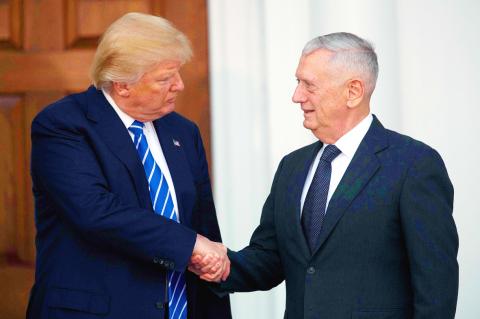US president-elect Donald Trump on Thursday said he would nominate retired US general James Mattis to be the US Secretary of Defense, making the announcement at a post-election victory rally in Cincinnati, Ohio.
Mattis, 66, is a former US Marine Corps general who retired in 2013 after serving as the commander of the US Central Command.
His selection raises questions about increased military influence in a job designed to ensure civilian control of the armed forces.

Photo: AFP/Getty
The concerns revolve around whether a recently retired service member would rely more on military solutions to international problems, rather than take a broader, more diplomatic approach.
For Mattis to be confirmed, US Congress would first have to approve legislation bypassing a law that bars retired military officers from becoming the US defense secretary within seven years of leaving active duty.
Mattis has a reputation as a battle-hardened, tough-talking marine who was entrusted with some of the most challenging commands in the US military.
In a tweet last month, Trump referred to Mattis by his nickname “Mad Dog” and described him as “A true general’s general.”
Mattis would be only the second retired general to serve as US defense secretary, the first being George Marshall in 1950-1951 during the Korean War.
Although his record in combat and his credentials as a senior commander are widely admired, Mattis has little experience in the diplomatic aspects of the job of US secretary of defense.
Center for a New American Security president Richard Fontaine described Mattis as a defense intellectual and as a military leader who distinguished himself in combat.
“He knows the Middle East, South Asia, NATO and other areas, and has evinced both a nuanced approach to the wars we’re in and an appreciation for the importance of allies,” Fontaine said in an e-mail exchange. “If he were to get the nomination, I suspect that he could attract a number of very talented people to work with him.”
Mattis drew scrutiny for his involvement with the embattled biotech company Theranos, where he serves on the board.
Born in Pullman, Washington, Mattis enlisted in the Marine Corps in 1969, later earning a history degree from Central Washington University.
As head of the Central Command from 2010 until his retirement in 2013, he was in charge of both the wars in Iraq and Afghanistan.
In 2005, he raised eyebrows when he told a San Diego forum that it was “fun to shoot some people.”
According to a recording of his remarks, Mattis said: “Actually, it’s a lot of fun to fight. You know, it’s a hell of a hoot... It’s fun to shoot some people. I’ll be right up front with you, I like brawling.”
“You go into Afghanistan, you got guys who slap women around for five years because they didn’t wear a veil,” Mattis said. “You know, guys like that ain’t got no manhood left anyway. So it’s a hell of a lot of fun to shoot them.”
Mattis was counseled to choose his words more carefully.

The US government has signed defense cooperation agreements with Japan and the Philippines to boost the deterrence capabilities of countries in the first island chain, a report by the National Security Bureau (NSB) showed. The main countries on the first island chain include the two nations and Taiwan. The bureau is to present the report at a meeting of the legislature’s Foreign Affairs and National Defense Committee tomorrow. The US military has deployed Typhon missile systems to Japan’s Yamaguchi Prefecture and Zambales province in the Philippines during their joint military exercises. It has also installed NMESIS anti-ship systems in Japan’s Okinawa

‘WIN-WIN’: The Philippines, and central and eastern European countries are important potential drone cooperation partners, Minister of Foreign Affairs Lin Chia-lung said Minister of Foreign Affairs Lin Chia-lung (林佳龍) in an interview published yesterday confirmed that there are joint ventures between Taiwan and Poland in the drone industry. Lin made the remark in an exclusive interview with the Chinese-language Liberty Times (the Taipei Times’ sister paper). The government-backed Taiwan Excellence Drone International Business Opportunities Alliance and the Polish Chamber of Unmanned Systems on Wednesday last week signed a memorandum of understanding in Poland to develop a “non-China” supply chain for drones and work together on key technologies. Asked if Taiwan prioritized Poland among central and eastern European countries in drone collaboration, Lin

ON ALERT: Taiwan’s partners would issue warnings if China attempted to use Interpol to target Taiwanese, and the global body has mechanisms to prevent it, an official said China has stationed two to four people specializing in Taiwan affairs at its embassies in several democratic countries to monitor and harass Taiwanese, actions that the host nations would not tolerate, National Security Bureau (NSB) Director-General Tsai Ming-yen (蔡明彥) said yesterday. Tsai made the comments at a meeting of the legislature’s Foreign Affairs and National Defense Committee, which asked him and Minister of National Defense Wellington Koo (顧立雄) to report on potential conflicts in the Taiwan Strait and military preparedness. Democratic Progressive Party (DPP) Legislator Michelle Lin (林楚茵) expressed concern that Beijing has posted personnel from China’s Taiwan Affairs Office to its

BACK TO WORK? Prosecutors said they are considering filing an appeal, while the Hsinchu City Government said it has applied for Ann Kao’s reinstatement as mayor The High Court yesterday found suspended Hsinchu mayor Ann Kao (高虹安) not guilty of embezzling assistant fees, reducing her sentence to six months in prison commutable to a fine from seven years and four months. The verdict acquitted Kao of the corruption charge, but found her guilty of causing a public official to commit document forgery. The High Prosecutors’ Office said it is reviewing the ruling and considering whether to file an appeal. The Taipei District Court in July last year sentenced Kao to seven years and four months in prison, along with a four-year deprivation of civil rights, for contravening the Anti-Corruption